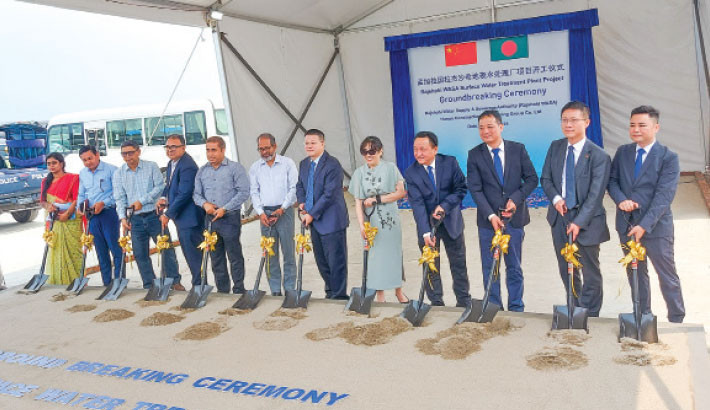Rajshahi’s historic step toward water security
Groundbreaking of Surface Water Treatment Plant promises a sustainable future with 200 million litres of purified water daily, ending reliance on groundwater
Ariful Islam, from Rajshahi
Published: 29 Apr 2025

Chinese Ambassador to Bangladesh Yao Wen attends the groundbreaking ceremony on the bank of the River Padma in Rajshahi on Monday. -Collected photo
Rajshahi has embarked on a historic project to secure its water future, breaking ground on the Rajshahi WASA Surface Water Treatment Plant, which will deliver 200 million litres of purified water daily and end the city’s reliance on rapidly depleting, contaminated groundwater.
The groundbreaking ceremony, held on the bank of the River Padma, marked a significant milestone in addressing the city’s long-standing water crisis.
For years, Rajshahi, in the cuntry’s northwestern plains, faced growing threats from dwindling water levels and arsenic contamination beneath the surface. Now, with nearly 700,000 residents relying on increasingly unsafe groundwater, the new project promises to transform the region’s water supply system, ensuring access to clean and safe drinking water for all.
The Tk4,062 crore project is funded through a loan from China Exim Bank, with the backing of the Belt and Road Initiative, which was first introduced during Chinese President Xi Jinping’s visit to Bangladesh in 2016.
It will see the construction of a state-of-the-art water treatment plant in Godagari, 26.5 kilometres west of Rajshahi city, capable of processing water from the Padma River for distribution across the city and surrounding municipalities.
Construction of the plant began in July 2023, following a loan agreement signed in May of the same year, with an expected completion date of June 2026.
The plant is designed to meet the growing demands of the city’s population, which is projected to rise to 160 million litres per day by 2027.
The project aims to increase coverage from 84% to 100% of the city’s population, raising daily water consumption per capita from 65 litres to 140 litres by 2035.
The Surface Water Treatment Plant, with its advanced purification systems, will be a crucial part of Rajshahi’s long-term water infrastructure.
The project includes a raw water intake station at Godagari, an extensive pipeline system, and a treatment plant with the capacity to produce 200 million litres of potable water daily.
The infrastructure will ensure a reliable and sustainable water supply, reducing dependency on underground sources that have been increasingly strained.
Chinese Ambassador Yao Wen, who attended the ceremony, described the project as a “milestone of resilience and partnership” between China and Bangladesh.
“This project embodies the spirit of the Belt and Road Initiative,” he remarked, reflecting on the vision that was first discussed during President Xi Jinping’s historic 2016 visit.
Ambassador Yao highlighted the collaboration of local and international teams in overcoming challenges to keep the project on track. As Bangladesh and China celebrate 50 years of diplomatic ties, the project stands as both an engineering marvel and a symbol of their enduring partnership.
The project is being executed by China’s Hunan Construction Engineering Group (HCEG) under the supervision of Rajshahi WASA.
Md Rezaul Alam Sarker, managing director of Rajshahi WASA, called the plant a “transformative leap toward sustainable urban living,” noting that it will end the city’s reliance on underground water and promote healthier, greener urban development.
Rajshahi’s current water supply meets only 70% of daily demand, with 107 million litres produced daily by 121 pumps. As the city’s demand grows, the project will help ensure long-term sustainability, supporting both urban growth and climate resilience.
The Surface Water Treatment Plant directly contributes to achieving the United Nations’ Sustainable Development Goal (SDG) 6, which aims for clean water and sanitation for all by 2030. Local government officials stressed that this project is not just about infrastructure, but an investment in the future, providing economic growth, health security, and climate resilience.
Moreover, the shift to surface water will reduce pressure on groundwater ecosystems, helping preserve vital resources for agriculture and biodiversity.
Xu Zhou, deputy general manager of HCEG’s International Branch, called the project “a beacon for future cooperation” and a model for what can be achieved through visionary leadership and international collaboration.
As part of Rajshahi’s 40-year water supply management plan, all existing pipelines and hydrants will be updated to ensure the city is prepared for future challenges, including the effects of a hotter, drier climate.
The Surface Water Treatment Plant stands as a promise fulfilled – an engineering achievement, a water crisis averted, and a lasting symbol of resilience for Rajshahi and its people.

